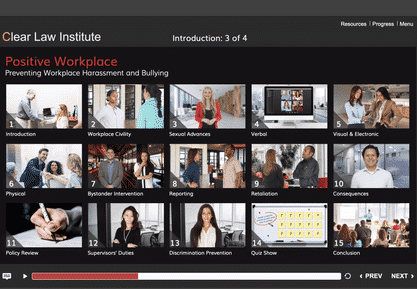Recent statistics signal the pervasiveness of sexual harassment within the healthcare industry and point to the importance of providing effective sexual harassment training. According to a survey of 6,200 physicians and clinicians conducted by Medscape in 2018, 7% of physicians and 11% of nurses, nurse practitioners, and physician assistants had experienced some form of sexual harassment. While about 47% of the perpetrators were physicians, 44% of nurses, PAs and NPs said the perpetrator was in a subordinate position to them, while 30% said the perpetrator was a peer, and 25% said they were a superior, indicating that harassment remains pervasive at all levels. The presence of sexual harassment incidences within the healthcare industry emphasizes the need for effective sexual harassment training.
Effective sexual harassment training should go beyond addressing legalese and organizational policies with the sole goal of reducing legal liability. Rather, sexual harassment training should incorporate multiple approaches and address nuances in order to cultivate a permeating workplace culture that emphasizes diversity, inclusion, and equity. These approaches could include empowering bystander training and workplace civility training.
Often times, organizations do not have the necessary expertise to create programs that are effective and address the nuances that are often prevalent in sexual harassment incidents. As such, relying on sexual harassment training created by those who have expertise on the subject matter may be extremely beneficial in mitigating the effects of organization shortcomings.
Beyond implementing an effective sexual harassment training program, it is necessary for organizations to eradicate aspects of their culture that hinder employees from reporting incidents of sexual harassment. According to the survey conducted by Medscape, 55% of the physicians and clinicians that were surveyed reported that they did not confront their perpetrators. This finding reveals a two-sided problem. Firstly, the formal complaint systems that companies currently have in place will continue to be insufficient as long as these programs are not complemented with a culture that emphasizes safety and simplicity—given the fast-paced nature of the industry—for employees who may face harassment. Organizations should implement an approach that gives employees multiple options (rather than a linear path) for making harassment complaints without employees facing fears of punishment and retaliation.
Secondly, this finding reveals that organizations may not be equipped with the necessary tools and expertise to conduct accurate and effective investigations of the complaints filed by employees. This may lead to investigation procedures that are marred by burying complaints, misinformation, partiality, and delay—all of which could impact employee morale and performance as well as put employers at risk of legal liability. Failure of the employer to conduct proper, timely investigations may signal to employees that reporting harassment may actually do them more harm than good which further feeds into a culture of hostility. Employers should ensure that anyone who investigates harassment complaints has received proper investigations training.
All organizations, including those in the healthcare industry, are responsible for fostering a work environment free of harassment and discrimination. The culture of a workplace has been shown to be a significant factor in determining how employees respond to workplace harassment. As such, it is necessary that employers engage their entire workforce in harassment prevention and take the onus of driving continuous workplace culture changes that consistently cultivates a culture of non-harassment.
Learn More
To comply with sexual harassment training requirements in all states, hundreds of employers, including numerous Fortune 500 companies, rely on Clear Law Institute. Learn more and view a free demo of our online training: Positive Workplace: Preventing Harassment at Work.
About the Author. Michael Johnson, CEO of Clear Law Institute, is a former U.S. Department of Justice attorney who brought one of DOJ’s first “pattern or practice” sexual harassment cases. He has provided training and consulting on harassment prevention or investigations to organizations around the world, such as the EEOC, the United Nations, and Google. He is a graduate of Duke University and Harvard Law School.
View Harassment Course Demo Now Pricing

View Harassment Course Demo
To view a 5-minute demo of our online sexual harassment training, Positive Workplace, please complete the form below and you’ll be able to watch the demo now.
The post Eliminating Sexual Harassment in the Healthcare Industry appeared first on Clear Law Institute.
Read full post at: https://clearlawinstitute.com/blog/sexual-harassment-in-healthcare-industry/

No comments:
Post a Comment